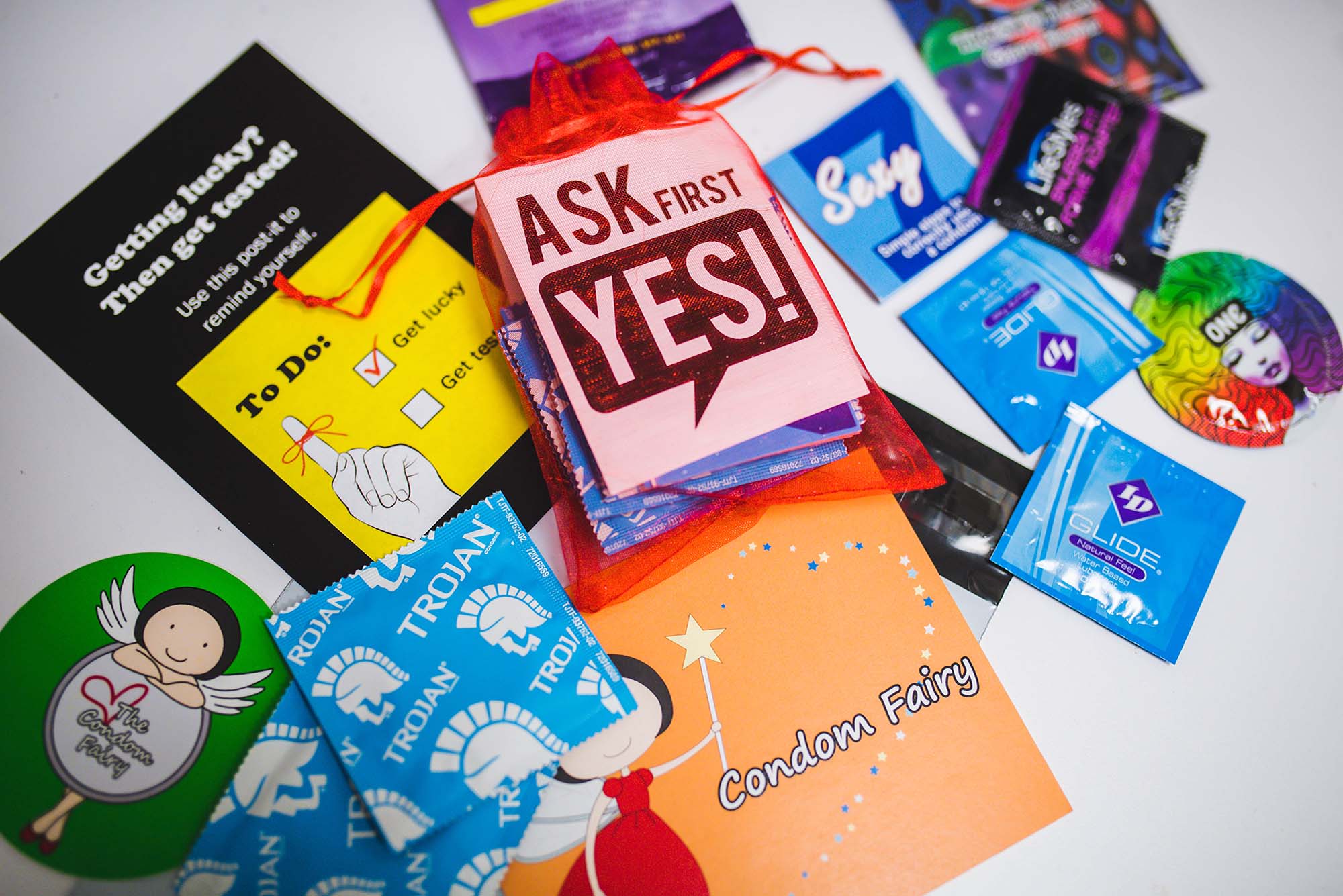Student Health Services Rolls Out New, Easier Testing Protocols for STDs and STIs
Applies to students with private, out-of-state–based insurance plans who don’t want their family’s insurance billed

Better safe than sorry: Student Health Services and the Condom Fairy, from Wellness & Prevention Services, are just some of the safe-sex resources available to BU students. Photo by Jackie Ricciardi
Student Health Services Rolls Out New, Easier Testing Protocols for STDs and STIs
Initiative comes as the rates of syphilis and gonorrhea cases rise on campus
Sexually transmitted diseases and infections are on the rise among 18-to-24-year-olds across the United States, a trend that’s been building for several years. In 2019, the Centers for Disease Control & Prevention reported that rates of syphilis and gonorrhea infections were at their highest since the 1990s, while chlamydia hit an all-time high.
BU is seeing similar trends, says Hannah Landsberg (Sargent’12, SPH’13), Student Health Services (SHS) associate director. “While chlamydia remains the most frequently diagnosed bacterial sexually transmitted infection among BU students, we have seen a decline in the chlamydia positivity rate and a small increase in the positivity rate for gonorrhea and syphilis in the 2021-2022 academic year compared to previous years,” Landsberg says.
Then there’s the impact the COVID-19 pandemic has had on sexual health. Experts predict that STI and STD rates most likely further increased in 2020 and 2021 (yes, even with social distancing measures in place), but because of myriad interruptions to testing and general healthcare during lockdown, it’s hard to say for sure.
Those interruptions are cause for concern. With a drop in testing comes a drop in diagnoses, and when left untreated, certain STIs can lead to serious health issues, including blindness and infertility. Not to mention the increase in community spread: as the past couple of years of battling COVID have demonstrated, one infection can quickly become two, three, or four, and no one wants to get that text from last week’s Hinge date.
That brings us to now: Student Health Services has just put new testing protocols in place for STIs and STDs. Previously, you’d have to schedule a prescreening appointment with an SHS provider, where they’d determine what tests you need, after which you’d go to the lab in the SHS clinic at a later date to do the tests. Now, in lieu of a prescreening appointment, you fill out a survey online through Patient Connect. (The confidential survey covers things like sexual history, symptoms, and demographic information, as well as what you’d like to be tested for.) A provider will review and order the proper tests for you. You drop in to the lab when you can—no appointment needed—do the tests, and within a couple of days, your results will be available in Patient Connect.
“The top visit type to our primary care clinic is STI screening,” Landsberg says, noting that SHS typically administers just over 3,200 STI and STD tests per academic year. “These protocols have been in the works for a while, but COVID-19 really exacerbated the need for them—now more than ever, we want people to get tested. The whole idea here is making it easier for students and to decrease barriers to testing.”
STI and STD testing at SHS is free to students with BU’s health insurance plan. SHS also offers treatment for STDs and STIs—including treatment for the sexual partners of BU students, under the Massachusetts Expedited Partner Therapy Initiative—and can anonymously notify any of your sexual partners of your positive test result if you are unwilling or unable to do so. In terms of preventive care, SHS provides PrEP services, or Pre-exposure Prophylaxis, to prevent HIV, in addition to offering the HPV vaccine Gardasil.
SHS isn’t the only safe-sex resource available to BU students. Off campus, you can access STI and STD testing through Planned Parenthood, near West Campus, and Fenway Health, among other organizations. In addition, students can access the Condom Fairy, a program overseen by SHS Wellness & Prevention Services that provides free and anonymous safe-sex supplies to students living on and off campus. BU’s Queer Activist Collective (“Q”) also offers safe-sex supplies, geared toward LGBTQ individuals.
At the end of the day, it doesn’t matter where you go or how you access testing or safe-sex supplies. What’s important is “actually making use” of the services available to you, Landsberg says, particularly now that the world has begun opening up after lockdown.
“Testing, vaccines, condoms, honest conversations about sex—all of it’s intertwined,” Landsberg says. “It’s similar to how we’re thinking about [stopping the spread of] COVID-19 with mask-wearing, vaccines, and public outreach. You need all of these things in order to have healthy relationships and healthy sex.”

Comments & Discussion
Boston University moderates comments to facilitate an informed, substantive, civil conversation. Abusive, profane, self-promotional, misleading, incoherent or off-topic comments will be rejected. Moderators are staffed during regular business hours (EST) and can only accept comments written in English. Statistics or facts must include a citation or a link to the citation.